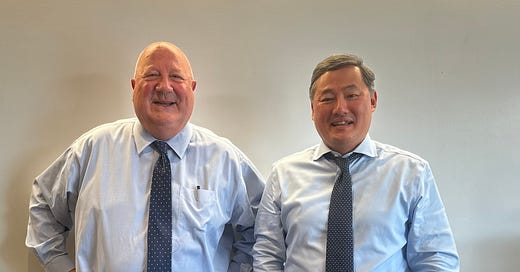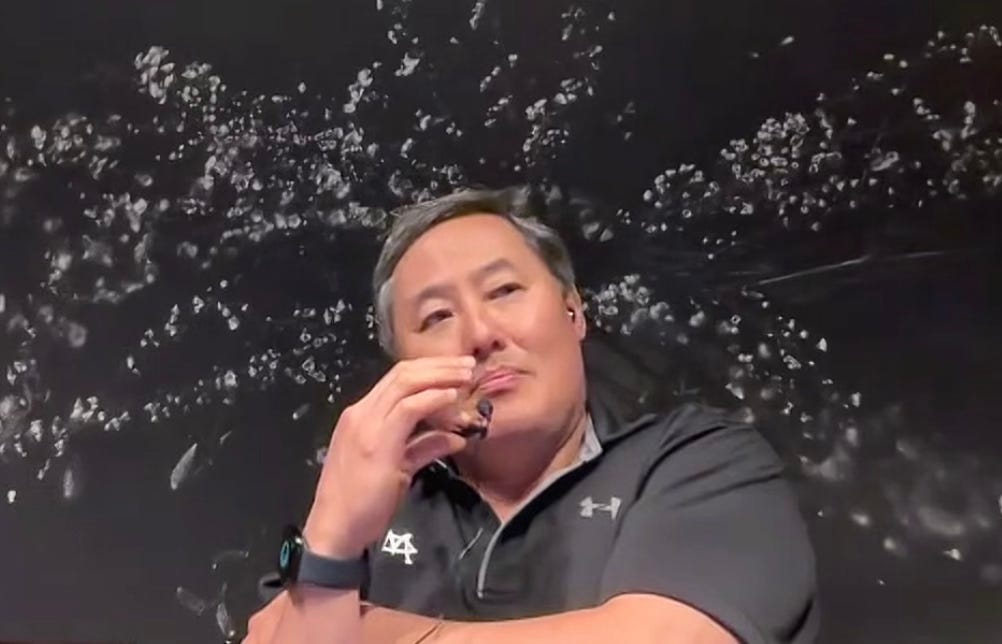Rethinking Foreign Policy, Part 4
John Yoo wiggles out of our collective pincer movement. Here we go again!
Editor’s note: The three-part attack on John Yoo last week has summoned forth a copious response from John here. We realize that by now we are tasking the patience and attention span of our readers (or at least require some kind of schematic drawing and a scorecard), and we may have to move this argument over the a podcast.
—Steve
What I love about arguing with Straussians is that they cannot agree on what they agree about. I don’t have to divide and conquer—they take care of the first step on their own. I will now turn to the second step.
First, let me summarize why Steve Hayward, Hadley Arkes, and Michael Deis say and where they disagree. Deis even disagrees that he is a Straussian, though then one wonders why he associates with the likes of Hayward.
Steve Hayward claims that Straussians should reject a Wilsonian approach to foreign policy. He understands Wilsonianism as based on the idea that human beings are perfectable and can subsume their nations into international government through technocratic leadership—much in the way the same progressives approached domestic policy. Relying on Thomas West’s 2004 Claremont Review of Books essay, "Leo Strauss and American Foreign Policy," Hayward reads Strauss as advancing an approach more like realism. According to them, Strauss interprets Plato as concluding that “wisdom,” not “justice,” governs relations between states. A state should pursue only “moderate needs” in its foreign affairs so it can focus on its main purpose of cultivating “civic virtue” at home.
Hayward could take this reading of Strauss to support a sort of America-First foreign policy that focuses primarily, if not exclusively, on homeland defense. If a nation does not directly threaten the territory of the United States, the United States has no interests toward it. Only foreign nations that threaten the homeland could interfere with the United States’s promotion of civic virtue for its people. What is important is that the United States focus on advancing the ideals of the Declaration of Independence and building a just regime at home. The regime type of other countries – he uses the perfidious French and the British (who tried to contain the United States throughout the 19th Century) – does not matter, except insofar as their domestic political system allows us to determine whether they are threats.
But then Steve’s response disappoints. For him, everything else other than self-defense is a matter of “prudence.” That leaves open almost all questions of foreign policy. All approaches to foreign policy, even Wilsonianism, assume that defending the nation’s territory is the highest, most important principle. To say that all other foreign policy questions are just policy is like saying that all domestic questions, other than individual self-defense, is just a matter of prudence. Steve often invokes “prudence” the way a squid emits ink to cover its retreat.
Hadley disagrees with Steve. I tend to agree with Hadley’s outcomes more than Steve’s on American foreign policy. I am glad that the United States has welcomed refugees from fascism and communism. I wish we had acted earlier to stop the Nazis and the Japanese in World War II, and I wish the United States had done more to stop the Holocaust. I agree with Hadley that the United States properly intervened in World Wars I and II and fought (and won) the Cold War. Steve, I take it, does not. There might be a bit of personal bias involved: as Hadley says, neither he nor I would be here were it not for the generosity of the United States. But Hadley’s foreign policy is not realism – it seems, in fact, quite opposed to Steve’s view that the United States should do little more than defend its territory and leave everyone else to their own devices. Hadley would have the United States act to help other nations even if there is no obvious benefit to our narrow self-interest.
One point to clarify on Hadley. I do not disagree with him that our regime type matters. I think all of us agree on that. I imagine that we also share much agreement on how the Constitution and the laws of our regime should function and the type of just society it should produce. But my question, which I do not think Hadley fully answers, is why the regime type of other countries should matter. Steve says it should not because Plato, as read by Strauss and West, says it should not. Hadley believes that the regimes of other countries does matter. He praises the United States’s transformation of Germany and Italy after World War II into capitalist democracies. He says that Reagan was right to aid the overthrow of dictator Ferdinand Marcos in the Philippines, and that the United States did the right thing to encourage the move to democracy in South Korea. Hadley would not make democracy the overriding goal of U.S. foreign policy, but he says that we should support the spread of government by consent to countries that have the culture for it, so long as it is within our resources. I agree with Hadley’s outcomes on the cases of Germany, Japan, South Korea, the Philippines and others (Taiwan, post-1989 Eastern Europe). But Hadley’s explanation is pure Wilson. His argument is that a moral principle (government by consent), not just cold-blooded calculations of national interest, should guide U.S. foreign policy. Can a reader explain how these two committed Straussians have ended up as polar opposites on American foreign policy?
Michael Deis’s contribution is probably closest to my own way of thinking. He describes the thought of his teacher, Professor Harold Rood, as holding that a President’s foreign policy seeks to advance “strategic freedom of action” under the conditions imposed by necessity. Necessity is the product of human nature, geography, our constitutional arrangements, and history. At that level of abstraction, it is hard to argue with Deis. I would re-formulate the variables a little differently perhaps. I would say that Presidents must set U.S. foreign policy ends that they can achieve within our means. The means are the resources that the nation can devote to foreign policy, which are the product not just of economics (material resources, industrial capacity, productivity) but also politics (popular support, political leadership, resiliency of institutions, will) and skill (military and diplomatic).
But here is where Deis disagrees with Steve and Hadley. The ends only start with homeland defense. As the ability of other nations to harm us has increased with technological advances, territorial self-defense can no longer be the sole goal of U.S. foreign relations. FDR, for his many faults on domestic policy, understood this brilliantly in foreign policy. He understood that the advent of the long-range bomber, large blue-navy fleets, and vast draftee armies meant that the nations of Europe and Asia could threaten the United States from across the seas. FDR and, more importantly, Harry Truman and Dwight Eisenhower understood that constructing alliances in the heartlands of Asia and Europe could prevent the rise of hostile regimes that could pose the same threats as Nazi Germany or Imperial Japan. As Deis says, that system worked, and I agree. I expect Steve would have to say that NATO and our alliances in Asia were a waste of money and resources, while Hadley would question why, during the Cold War, we support so many authoritarian, though anti-communist, regimes that oppressed the natural rights of their citizens.
I agree with Deis that the right question to ask is how American foreign policy should change now that the Cold War is over. “What prompts us to think that the security arrangements established post-World War II will forever endure?” This important question elucidates the differences between me and my 2.4 Straussian opponents (I consider Deis to be 0.4 Straussian because, despite his protestations, he took his Ph.D at Claremont Graduate University, where he must have absorbed some Straussianism in his required political theory classes). Steve provides no way to think about foreign policy beyond self-defense, and indeed he and West seems to suggest that we should have little active foreign policy toward any nation or region that does not threaten us. It is hard to see any difference between Steve and the traditional isolationist foreign policy that reigned in the United States before the World Wars. In fact, Steve would probably support a foreign policy that was even less interventionist than our pre-1914 foreign policy, because his approach must look dimly on our 19th Century wars of expansion, which arguably distracted if not undermined our system’s focus on domestic civic virtue. The Mexican-American War of 1848, for example, led to the incorporation of vast territories that may have accelerated the coming of the Civil War as Southerners sought to spread slavery to the new territories and states. For Steve, foreign policy is not matching ends and means, because our ends are so distorted that we can fix our problems simply by reaching for the borders, not the stars.
Hadley, I think, would take Steve to task for his limited horizons. He would waive in Steve’s face his great two-volume biography of Ronald Reagan. Reagan did not just limit our foreign policy to statically containing the Soviet Union, which would have presented a far more modest goal for the 1980s. Indeed, Richard Nixon and Henry Kissinger, perhaps the most realist strategists to sit in the White House during the Cold War, believed their policy of détente represented a proper re-balancing of our strategic ends and means. Reagan instead set as our foreign policy the defeat of the Soviets and the expansion of democracy. He did not justify the Reagan Doctrine solely on the grounds of pure national interest, but instead he believed that spreading human freedom was a just goal in itself. Reagan was the right President to close the curtain on the Cold War by melding realism and Wilsonianism into a foreign policy that succeeded.
But I find Hadley’s approach mysterious as to the future. I agree that it was a benefit to our foreign policy for the United States to support the transformation of other countries into democracies. I differ from him in that I think it was in our national interest, rather than a goal of pure moral justice. Our WWII and early Cold War leaders believed, with some evidence, that the severe economic dislocations of the Great Depression had provided the soil in which fascism had taken root. They concluded that in order to prevent the return of totalitarianism to Asia and Europe, we should transform our former enemies into capitalist democracies. The great leaders who were “present at the creation” of the post-WWII system of alliances succeeded. But they do not provide a guide to Hadley about what to do now. I cannot tell, for example, if Hadley would support continued U.S. leadership of NATO, our efforts to cooperate with Asian nations to contain China, or our continuing support of Israel in the Middle East. If Hadley seeks to advance positive regime change at low cost, he might even have more interest in South America or Africa, where we could no doubt have enormous influence in encouraging capitalism and democracy at very low cost.
It is finally on future where I disagree with Deis, though it is unclear what his final views are. He questions whether NATO makes sense for the United States in light of “changes in the global correlations of forces.” I agree with him that no alliance and no foreign policy is forever. But surely he would agree that the rise of a hostile China represents a threat to the United States as great as, if not greater, than the Soviet Union – or indeed, any enemy in our history. The Chinese Communist Party has to goal of unseating the United States from its position of leadership in the world, and in particular to push us out of Asia. If the CCP’s goal is the restoration of China’s historical place in Asia, it presumably would want to establish a suzerienty over Korea, Japan, Vietnam, Thailand, the Philippines, parts of India and Central Asia, and perhaps Indonesia and Malaysia. Maybe the CCP would stop the expansion of its influence at Australia and Hawaii, maybe not. China, unlike the Soviets, command economic resources, advanced scientific and technical knowledge, and a growing military that could soon place it on a par with the United States. A realist approach to foreign policy, which I believe Deis and I share, would identify the containment or defeat of the Chinese Communist Party as our chief goal.
I agree with Deis that in this new environment, the United States will have to adjust our anti-China strategy to match the means available. Due to our burgeoning welfare state and heavy debts, the means available for defense are shrinking as a percentage of GDP. We will have to let go of marginal foreign policies – the list of USAID grants represents a good starting point. But I disagree with Deis’s suggestion that this should force us to consider dropping out of NATO or fundamentally changing our system of alliances today. If we refocus our military deployments and political attention to China and Asia, our alliances will become more -- not less – important. If we drawdown our forces in Europe, for example, NATO will allow us to still keep the resources of the one of the world’s three great industrial heartlands out of the hands of our rivals and opponents. NATO incurs costs on us, of course, and we have struggled for decades to convince the Europeans to pay more for their own defense. But NATO also allows us to shrae the burdens of keeping the Russian from controlling the vast resources of the European continent. If we were to leave NATO, Russia would expand its influence westwards and China would no doubt benefit while our economy would suffer. A similar analysis would apply to our Asian alliances. Threatening to reduce our deployments and relationships in Asia would only force the United States to shoulder more of the burden on itself if, indeed, we intend to contain the rise of China. A realist should find our conduct in our own hemisphere troubling too. In order to take on China, we need to marshal all the economic resources that we can. Expanding free trade in the Western Hemisphere makes available the vast natural resources, human capital, and markets for a long struggle with Beijing. Damaging those relationships will reduce the means available for a competition that may be decades long. The answer to the threat from China is not to create an autarky or to pursue a 21st century version of isolationism, but to make our alliances stronger so that we can organize – as we did during the Cold War – the Free World to resist the predations of China and its allies.







https://paulwilks.substack.com/p/a-grand-jury-must-be-empaneled-to
I like all you guys, but I'm quite confused as what qualifies as Straussian. I'll keep my wing tips out of that flak cloud. As we pursue our national interests, the moral nature of other nations should absolutely inform our decisions. That's just prudence; if we invite communists into our free trade club they will eventually wreck it.